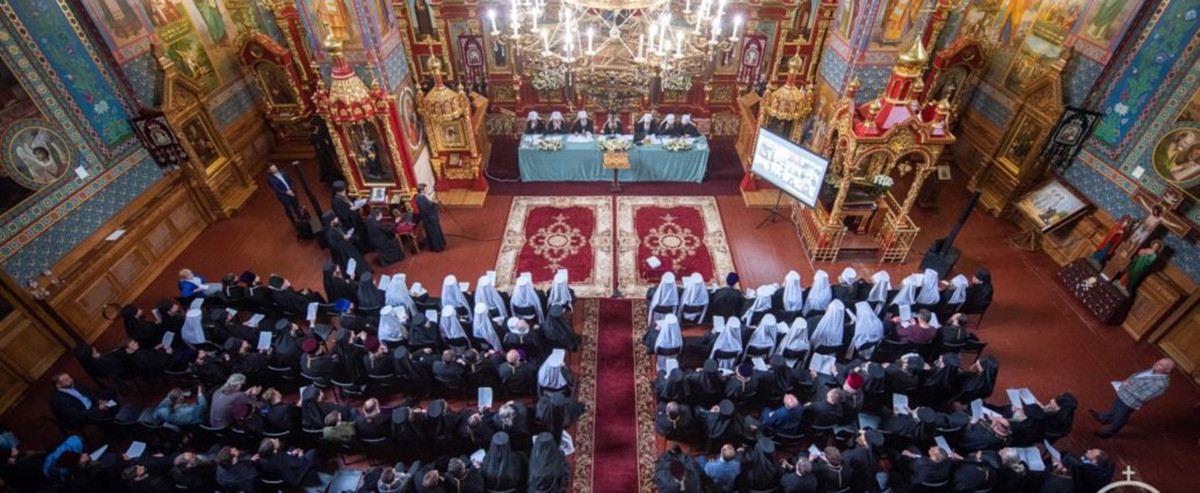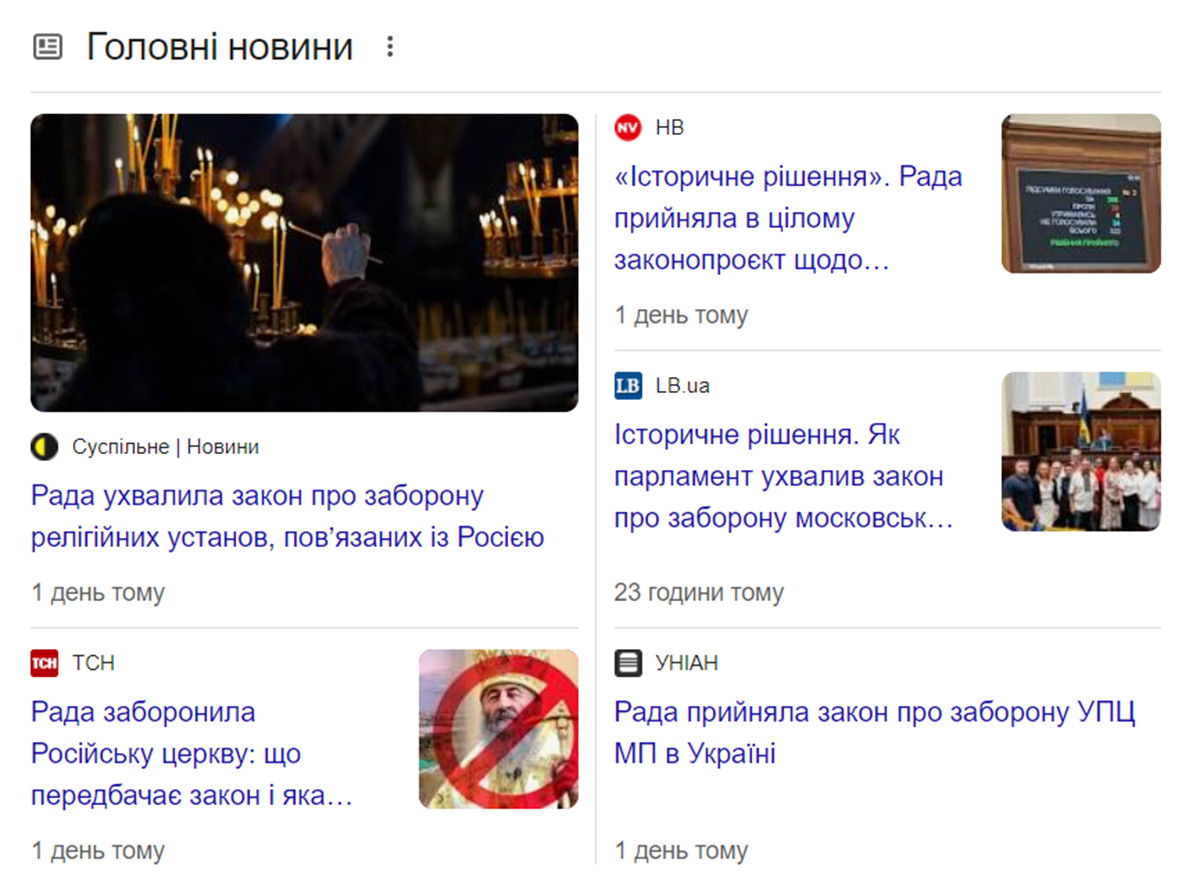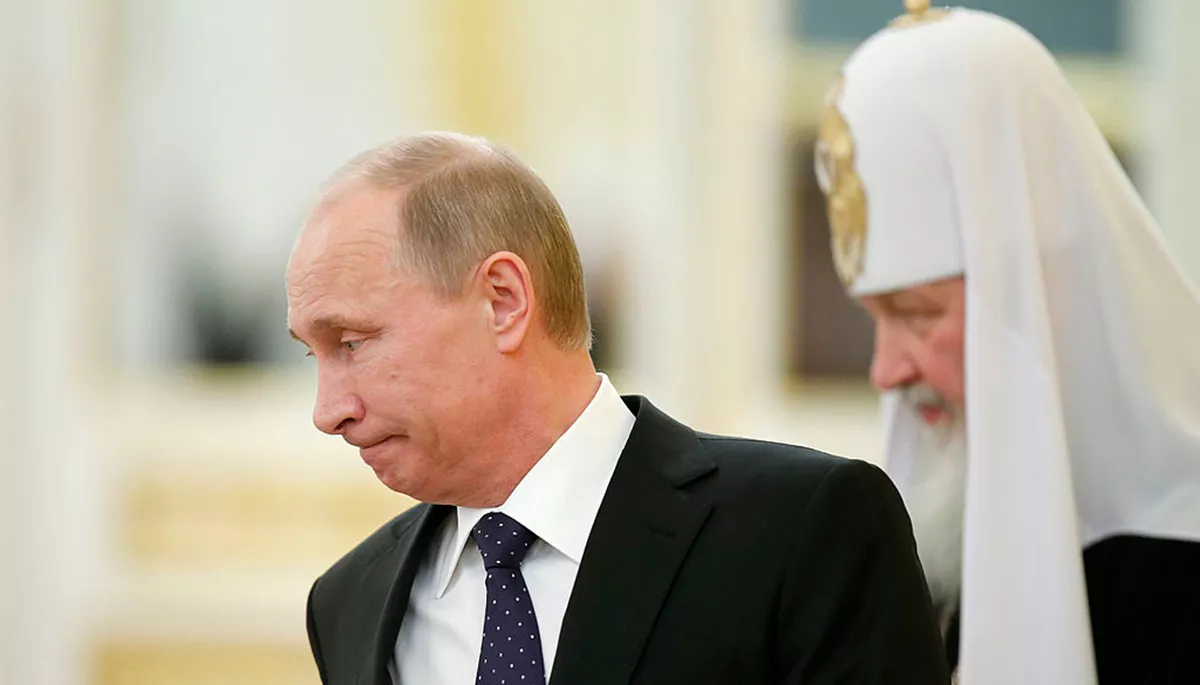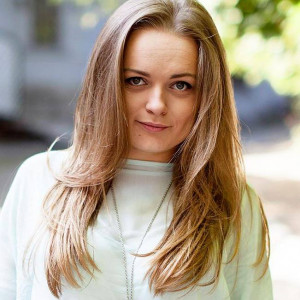The law is far from perfect, but it is necessary.
Читати українською
On August 20, the Verkhovna Rada of Ukraine passed the draft law No. 8371 in its second reading, which bans religious organizations affiliated with the Russian Orthodox Church (ROC). On August 23, the Speaker of the Verkhovna Rada, Ruslan Stefanchuk, signed the bill and sent it to President Volodymyr Zelensky for his signature. On August 24, President Zelensky signed the law. In the media, it is commonly referred to as the "ban on the Ukrainian Orthodox Church (Moscow Patriarchate)." In reality, the UOC (MP) is not a single legal entity but is dispersed into parishes and religious communities. The law only bans one religious organization in Ukraine—the Russian Orthodox Church. "Detector Media" explains what this law is about, how it will work in practice, and what consequences it may lead to.
Trojan Horse or Whom the UOC Truly Served
The Ukrainian Orthodox Church of the Moscow Patriarchate (UOC-MP)—an unofficial media name to distinguish it from the Kyiv Patriarchate—has always been subordinated to the Russian Orthodox Church (ROC) according to its statute. The Parliamentary Assembly of the Council of Europe (PACE) recognized the ROC as an instrument of influence for official Moscow and propaganda. Essentially, the UOC-MP, as a subordinate structure to the ROC, worked in Russia's interest. Media reports have repeatedly noted that as early as 2014, militants and weapons were hidden in UOC-MP churches in eastern Ukraine. Read more on this here, here, here, here, and here.
This was confirmed by the Russian terrorist Igor Girkin, who led the capture of Ukrainian territories. He mentioned that monks from the Sviatohirsk Lavra fought on the side of the militants and "blessed" the creation of his group. During the full-scale invasion in 2022, Patriarch Kirill awarded the head of the Russian Guard, who participated in the invasion, with an icon and called the war against Ukraine holy.
There is also evidence that UOC-MP priests collaborated with the occupiers. For instance, they helped Russians kidnap residents of Kyiv and take them to Belarus in the first month of the full-scale invasion, cooperated with Russian troops in occupied territories, and eventually fled with the occupiers to Russia when Ukrainian forces liberated these territories. Russian occupiers, after banning the Ukrainian Greek Catholic Church (UGCC) in occupied territories and continuing to persecute OCU priests, appointed Metropolitan Panteleimon of the UOC-MP as the head of a so-called "inter-eparchial center for training specialists of the Luhansk eparchy"—a religious body of the occupiers. Even a year after supposedly severing ties with Russia, "Ukrainska Pravda" found Russian passports among UOC-MP leaders, including Metropolitan Onufriy and 20 other hierarchs. Despite Metropolitan Onufriy’s claim that he had renounced Russian citizenship, Russian journalists found no evidence of this.
As of the end of August, according to the Security Service of Ukraine (SBU), more than 100 priests of this denomination are involved in criminal proceedings, with 50 receiving suspicions and 26 convicted.

In an effort to distance itself from the words of the head of the Russian Orthodox Church (ROC), on May 27, 2022, the Ukrainian Orthodox Church of the Moscow Patriarchate (UOC-MP) held a Synod and removed the "MP" (Moscow Patriarchate) from its name, claiming to have broken ties with Russia.
The updated church charter was not published for a long time, but after its release, experts concluded that it does not prove that the UOC-MP is a separate structure independent of the ROC.
Viktor Yelensky, head of the State Service for Ethnopolitics and Freedom of Conscience, discussed the existing ties between the UOC-MP and the ROC. He stated that "the head of the UOC-MP is still a member of the ROC Synod, and the bishops of this church are members of the ROC Episcopate."
Despite the UOC-MP's attempts to demonstrate this separation, its functionaries acknowledge the opposite, says religious scholar Yuriy Chornomorets. "The rector of the Kyiv Theological Academy, Archbishop Sylvester, their best expert on canon law, says: 'According to the canons, we are still part of the Moscow Patriarchate, but we do not follow any orders from Moscow. Therefore, Ukraine should treat us well despite the fact that we are still part of the ROC.' I consider this absurd because, during a war, how can a Russian religious organization operate on our territory? They should make a decision. If Metropolitan Onufriy had even a small desire to disconnect from Moscow, he could do so very quickly," he said in an interview with Radio NV.
Religious Decolonization — A Long Way Forward
At the end of November 2022, the first version of the bill 8221 on strengthening national security in the field of freedom of conscience and the activities of religious organizations was introduced by MP Mykola Knyazhytsky. It proposed banning the activities of the ROC and religious organizations directly or indirectly subordinated to it in Ukraine.
According to it, two months after the law's enactment, all leases or use of state and municipal property by such organizations were to be terminated, and all transactions with these structures by Ukrainian residents were to be banned. It also stipulated that only structures of the OCU or those authorized by the OCU could use the word "Orthodox" in their names.
This draft law was unanimously supported by the Verkhovna Rada Committee on Humanitarian and Information Policy, but it was never included in the agenda of Verkhovna Rada sessions, despite a petition demanding a vote on it receiving the necessary number of signatures.
In December 2022, MPs from various factions registered another draft law (8262) that also proposed ending the use of state and municipal property by UOC-MP structures and simplifying the procedure for transferring communities to the OCU. This draft was also supported by the relevant committee but was similarly blocked.
Despite this, on December 1, 2022, President Volodymyr Zelensky enacted an NSDC decision requiring the Cabinet of Ministers to submit a draft law to the Verkhovna Rada within two months prohibiting the operation of religious organizations affiliated with centers of influence in Russia. In essence, the government took the initiative. Therefore, in January 2023, the government submitted its draft law (8371), based on the vision of Viktor Yelensky, head of the State Service for Ethnopolitics and Freedom of Conscience (DESS).
But during the war and the public's demand to resolve the UOC-MP issue, MPs from different factions decided to focus on refining the draft law. More than six months passed between the first and second readings. During this time, over 1,300 amendments were made to the draft, significantly changing it.
"The first version of the government draft law was very short and assumed that all other provisions would be introduced by other regulatory legal acts. Now the draft law is better worked out and more detailed. I do not consider this draft law ideal, and I have repeatedly said so, but in any case, it is better with it than without it," Viktor Yelensky said in a comment to "Detector Media."
What Awaits the UOC-MP
Opponents of the law and some media claim that it is about banning the UOC-MP. This wording has taken root in Ukrainian media.

However, according to MP and head of the Verkhovna Rada Committee on Humanitarian and Information Policy Mykyta Poturaiev, such a claim is not accurate because the issue is not about banning anyone or anything, but about Ukraine breaking ties with the enemy and creating the necessary conditions for this. But this must be done while respecting all principles of legality and democracy.
"To say that this law bans the UOC-MP is not quite correct or even completely incorrect. But it is a logical continuation of the policy of severing all ties with the aggressor state that Ukraine has been pursuing consistently since 2014, when Russia's war against Ukraine began. And in the latest PACE resolution, it is stated that the so-called Russian Orthodox Church only masquerades as a religious organization and is actually part of the Russian state's totalitarian mechanism. Therefore, of course, tolerating any presence of an essentially hostile mechanism in our country, which is defending itself from aggression with all its might, is impossible and unacceptable. This is not about faith or religion. It is about our struggle with the enemy," Mykyta Poturaiev said in an interview with "Radio Svoboda."
"The law only bans one religious organization — the Russian Orthodox Church, which, as emphasized there, has become an extension of Russia's aggressive regime — this is a direct quote from the PACE resolution. During the time this draft law was being amended, the Russian Orthodox Church went from being an inspirer to a direct participant in Russian aggression. Therefore, this organization is banned on the territory of Ukraine," Viktor Yelensky told "Detector Media."
Thus, law 8371, in essence, is not a ban on the UOC-MP. It provides for changes in legislation designed to facilitate the banning of Russian church structures through the courts. And this law introduces a mechanism for breaking religious organizations' ties with Moscow. They have nine months to do this. After that, DESS will be able to conduct religious studies to identify any subordination of religious organizations to centers in Russia.
"The Ukrainian Orthodox Church of the Moscow Patriarchate is an association, not a legal entity. But it has a center, namely the Kyiv Metropolis. If it is determined that the Ukrainian Orthodox Church of the Moscow Patriarchate is part of the ROC, then they will be issued an order specifying what constitutes this connection or, in legal terms, affiliation. This could involve, for example, the fact that the head of this church is a member of the ROC Synod. And even historically, he is a member of the Synod. This is a sign that they belong to the ROC. Furthermore, the bishops of this church are members of the ROC Episcopate. There will also be an order: 'Please, exit,'" Viktor Yelensky explained.
If DESS, in its examination, finds any religious organization subordinate to a center in Russia, it will give it another month to comply with the order. After that, the state will go to court to cancel the registration of such an organization, which will effectively prevent it from conducting any economic activities, not to mention renting state or municipal property.
At the same time, there is a possibility that UOC-MP representatives will say that the break has occurred, but the ROC is not making the necessary changes to the documents and does not recognize these changes. There is also a solution for this case.
"Their defenders may say that the situation is beyond their control. That they left the Russian organization, but the Russians still consider the UOC-MP part of the ROC. Therefore, supposedly, they cannot influence what the Russians say. But such a situation is provided for in the law. Then they need to write: 'Dear ROC members, we are no longer part of your church, we are not members of either the Synod, the Episcopate, or the synodal commissions and the so-called inter-council presence.' That is, to publicly renounce these ties and really stop participating in these structures," Viktor Yelensky said.
After the transitional period, religious organizations will have two options: litigation with uncertain prospects or concessions to the state.
"Over these nine months, the UOC must decide which path to take and what future it chooses for its believers. There is a path of confrontation, radicalization, and openly working for the enemy. And there is a more moderate path — to really break ties with Moscow and the Kremlin. At the same time, they will not completely lose their canonical status, but there will still be some problems with this. Or they can respond to the call of Metropolitan Epiphanius, head of the OCU, to resume dialogue and begin the process of unification," said Mykyta Poturaiev.
The first version of the draft law provided that only DESS could go to court. But through amendments, it was changed so that religious organizations themselves could challenge the results of religious studies and DESS orders. This put DESS in a losing position, says philosopher Oleksiy Panich.
"The first edition was very short, and it gave the State Service for Ethnopolitics and Freedom of Conscience the right to go to court on its own initiative if it conducted an examination and targeted a specific organization affiliated with the ROC," the expert explained.
Now the Verkhovna Rada must vote on the draft law in its second reading. It is still unknown when this will happen. But experts and MPs alike believe that the law will be passed soon.
"None of the bills that had the same content, even when discussed behind the scenes, gathered the necessary number of votes to pass in the hall. But this draft law received 267 votes in its first reading. Therefore, I am convinced that it will be passed," Oleksiy Panich said.
However, the head DESS, Viktor Yelensky, says that granting the right to appeal to everyone is a democratization of the process.
"We are not Libya's Jamahiriya, nor are we the Democratic People's Republic of Korea. They can go to court, and so can we. We look and say, 'The first, second, third, fifteenth point indicates that you are part of the Russian Orthodox Church (ROC), and we ask you to eliminate this; here is your directive.' They look at this directive and, just in case, appeal it. Our version of the bill, which we submitted, did not provide for this appeal, but now it will be included. For example, they appeal, and we prove our position. If they eliminate all the objections, then we say, 'peace on earth and everything is fine.' If they do not want to eliminate them, we go to court and terminate the registration of this religious organization on clear grounds, particularly because they remain part of the ROC, which is a criminal structure of Putin," explains Viktor Yelensky. "We will not be suing each religious organization individually but rather the Metropolis, i.e., the central authority. If the activity of the central authority is terminated, then individual communities will seek refuge. So, no one will be running around with the police, closing each church, and putting seals on them. But stopping the activities of these structures—the Metropolis, all the administrations, and so on—is within our power."
Yuriy Chornomorets shares the same opinion. He says that the stubborn supporters of the ROC are not as frightening as they want to seem, and not all of them will be so active or want to challenge the state in courts.
"Since 2022, the Ukrainian Orthodox Church of the Moscow Patriarchate (UOC-MP) has been saying that they have no ties with Moscow. But then, in January 2023, an examination was conducted that proved the UOC-MP remains entirely part of the ROC. And they started protesting against this and threatening to appeal this conclusion in court, but they have not done so yet," says Chornomorets in an interview with NV.
Why Give More Time?
Religious organizations will have nine months to sever ties with the ROC. Oleksiy Panich says that this is a reasonable period, and only after its expiration will we see how the law works.
"It could not be less than nine months because the legal mechanism prescribed in the law needs to unfold. But after these nine months, the parties will only take their positions, and the fight will begin right after this period," says Oleksiy Panich.
In Yuriy Chornomorets' opinion, if the UOC-MP priests were truly independent, they would have severed ties when Russia first fired missiles at Ukraine.
"In my opinion, these nine months are an attempt to stretch out, soften the blow, and decide something after the American elections, such as closing churches, etc. Instead of cutting off the dog's tail at once, we are cutting it off centimeter by centimeter," he says. "In my opinion, in church matters, it is possible to find a solution and sever ties within a maximum of three months if you want to. But if you want to remain with Moscow, that is also your choice—bear responsibility for it."
Does This Law Violate Freedom of Religion?
When this bill was adopted as a basis in October 2023, the UOC-MP immediately responded that it allegedly violates human rights. Specifically, the legal department of this church stated that the bill "violates the right to freedom of religion and contains significant legal flaws and does not comply with the European Convention on Human Rights or the Constitution of Ukraine."
In reality, this is very expected—human rights activist and executive director of the Ukrainian Helsinki Human Rights Union, Oleksandr Pavlichenko, says: complaints to the European Court of Human Rights (ECHR) will come. But there is nothing for us to fear.
"In this case, we are talking about freedom of religion, i.e., Article 9 of the European Convention on Human Rights. They may appeal to it, arguing that this norm has been violated," said Oleksandr Pavlichenko to 'Detector Media.' "But here we are talking about the grounds on which the prohibition is established. Article 9 has two parts: the first—proclaiming freedom of belief and religious practices, and the second—establishes restrictions that the state is allowed to impose. And these restrictions have three components. First, there must be clearly formulated legal restrictions—this is what has now been done. Second, there must be a list of conditions under which this restriction is imposed, i.e., the protection of territorial integrity and public order. Third, this prohibition must be necessary in a democratic society. Because any prohibition is, on the one hand, an infringement of a right, and on the other hand, it is justified or unjustified from the point of view of the ECHR."
In this case, the restriction of rights is provided by the fact that our state is fighting to preserve its borders, territorial integrity, and national security. And the prohibition of ties between the UOC-MP and the ROC, which serves as an ideological tool of Russian aggression, is entirely justified.
Moreover, the human rights activist says, Russia's aggression itself has effectively untied Ukraine's hands in this matter. "Russian aggression has given us these grounds. That is, we have now done what would have been very difficult to do before the full-scale invasion, and now such a decision is legally more justified. Therefore, I believe that this process is correct, and this law does not need to go through the Venice Commission," explains Oleksandr Pavlichenko. "Moreover, our law provides for a nine-month transition period. There have been no repressions, no violent destruction, or any categorical prohibition—no. It is proposed to sever ties with the Russian Church because having a branch of the pro-Putin church with its ideology in Ukraine is nonsense."
Finally, the All-Ukrainian Council of Churches and Religious Organizations supported law 8371. On August 17, a few days before the vote on it, the Council approved a statement: "We categorically condemn the activities of the Russian Orthodox Church, which has become an accomplice in the bloody crimes of Russian invaders against humanity and which blesses weapons of mass destruction and openly declares the need to destroy Ukrainian statehood, culture, identity, and recently, even Ukrainians themselves. [...] No organization—whether religious or secular—that has a center in a country that has carried out military aggression against our people and is controlled by the aggressor state can operate in Ukraine. [...] We assert that in Ukraine, even in the conditions of a brutal war, religious rights and freedoms are respected, and our believers, despite certain challenges related to the war, have the opportunity to express their religious feelings and beliefs with dignity. The main threat to religious freedom in Ukraine is Russian aggression, as a result of which the occupiers have killed dozens of clergy, destroyed hundreds of churches and prayer houses. The Moscow Patriarchate justifies pogroms and restrictions on religious freedom, torture, and killings of priests and pastors, and cynically tramples on the Lord's commandments and the basic norms of universal human morality."
This statement is another argument in response to the attempts of Russian propagandists to accuse Ukraine of infringing on freedom of religion and human rights.
In the end, other countries are also taking steps to sever ties with the Russian Church. On August 21, the day after this law was passed here, the Estonian Orthodox Church of the Moscow Patriarchate convened a Synod, at which it also amended its charter and declared the severance of ties with Moscow, removing the "MP" prefix from its name. It is now beginning negotiations with the Estonian Apostolic Orthodox Church (EAOC), recognized by the Ecumenical Patriarchate, to unite all Orthodox Christians in Estonia—this was agreed upon back in July.
According to MP Yevhenia Kravchuk, the activities of the ROC are also being checked in the Czech Republic. "In many European countries, eyes are now opening to the activities of the ROC. We are pleased with this and can share the text of the law with them," Yevhenia Kravchuk was quoted by 'Ukrinform.'
So, what do we have in the end? At present, this is not a ban on the UOC-MP—such a decision would be much more difficult to make, and challenging it would be much easier. But the adoption of the law is a step towards spiritual independence, as President Volodymyr Zelensky mentioned. There is still a lot of work ahead, and it can be assumed that success on the path of religious decolonization will require not only skillful work by DESS but also continued public control, especially at the stage of possible court cases.
Cover photo credit: GettyImages



